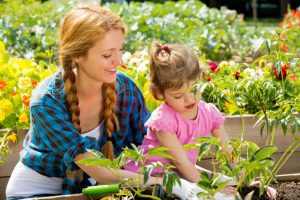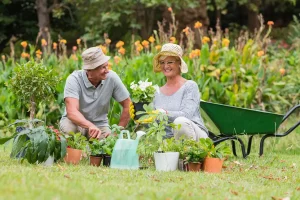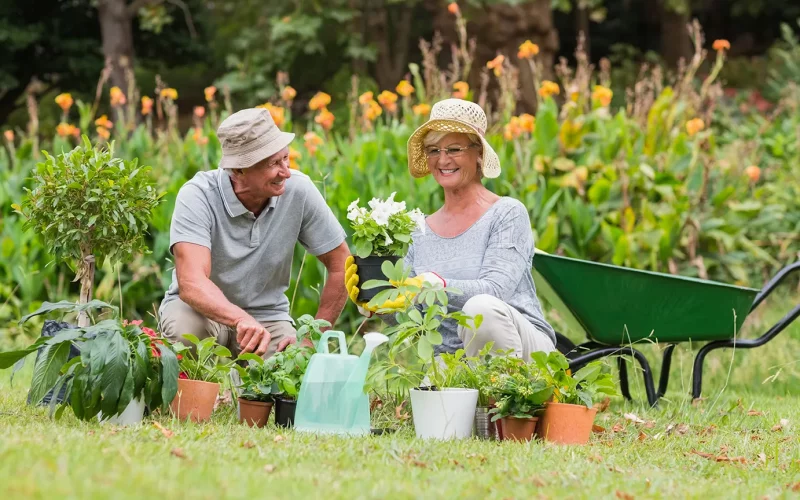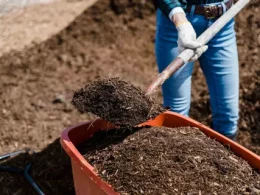Introduction:
Your garden can be a source of fresh, nutrient-rich produce that contributes to a healthier lifestyle. Dr. Barton emphasizes the importance of understanding the composition of your soil. She states,”The quality of your soil plays a pivotal role in the nutritional content of your garden’s produce. “For enthusiasts, this knowledge is a game-changer. Dr. Barton’s expertise in horticulture allows you to optimize your garden for nutrient-rich harvests. Here are some key tips for achieving this: Soil Testing: Understanding your soil’s composition is essential. Dr. Barton recommends conducting a soil test to determine its pH level, nutrient content, and overall health. Based on the results, you can make targeted improvements. Composting: Composting is a powerful method to enrich your soil naturally. By recycling kitchen and garden waste

Physical Exercise
Dr. Barton explores advanced gardening workouts that not only help you stay in shape but also provide a holistic approach to fitness. Gardening offers a unique opportunity for physical exercise. The various tasks involved in gardening, such as digging, planting, weeding, and tending to plants, engage different muscle groups and promote flexibility. Dr. Barton explains, “Gardening is a fantastic way to maintain physical fitness without the monotony of traditional workouts.” Enthusiasts can take their gardening to a new level by considering it a form of exercise. Dr. Barton suggests incorporating gardening into your fitness routine. Whether it’s a dedicated gardening workout or integrating gardening tasks into your existing fitness regimen, this advanced technique not only keeps you fit but also aligns with your love for gardening.
Approach to Fitness
The holistic approach to fitness through gardening goes beyond physical exercise. It extends to mental and emotional well-being. Gardening allows you to connect with nature, which has been shown to reduce stress and improve mood. Physical fitness is not just about exercise; it’s about overall wellness,” says Dr. Barton. “Gardening provides a unique blend of physical activity and mental relaxation, making it a holistic approach to fitness.” For enthusiasts, this means a more profound connection between gardening and well-being. It’s about recognizing that your time in the garden contributes to your overall fitness and wellness goals.
Mental Health
Gardening isn’t just about physical health; it’s also a powerful tool for managing stress and anxiety. Dr. Barton delves into the influence of nature on mental well-being and provides techniques to help you deal with stress and anxiety effectively. The human-nature connection is undeniable. Studies have consistently shown that spending time in green spaces, like gardens, can reduce stress, anxiety, and depression. Nature has a calming effect on the mind and fosters emotional well-being. “Gardening is not just about plants; it’s about nurturing your own well-being. The act of gardening, being close to nature, and witnessing the cycle of life has a profound impact on your mental health.” For enthusiasts, this is an advanced technique to harness the therapeutic benefits of gardening fully. By understanding the science behind nature’s influence on mental well-being, you can intentionally use your garden as a place of refuge and rejuvenation.
Anxiety Management
- Mindful Gardening: Embrace mindfulness by being fully present in your garden. Pay attention to the details, breathe in the scents, and appreciate the beauty around you. Mindful gardening can be a powerful stress-relief technique.
- Gardening as a Creative Outlet: Gardening allows you to express your creativity. Whether it’s through landscape design, plant selection, or artistic garden decor, being creative in your garden can be therapeutic and inspiring.
- Green Therapy: Spend time in your garden as a form of therapy. Dr. Barton suggests setting aside moments for “green therapy,” during which you intentionally relax and unwind in your garden, immersing yourself in the natural beauty.

by https://www.cosyfeet.com
Immune System
Gardening can positively impact your immune system. Spending time outdoors, interacting with soil, and being exposed to a variety of plants and microbes can strengthen your body’s natural defenses. Dr. Barton elaborates, “Gardening exposes you to beneficial microbes in the soil, which can enhance your immune system’s function. Additionally, the stress-reduction benefits of gardening have a direct positive impact on immune health.” For enthusiasts, this is an advanced technique to take control of your well-being through the green therapy your garden offers. By understanding how gardening supports your immune system, you can embrace it as a preventive healthcare practice.
Key Points
| Topic | Key Points |
|---|---|
| The Healing Power of Gardening | Gardening as a therapeutic experience |
| Lowering stress levels and improving mental health | |
| Embracing gardening as a form of self-care | |
| Dr. Barton’s expertise in holistic well-being | |
| Mindful Gardening Techniques | Embracing mindfulness in your garden. |
| The science behind stress reduction | |
| The calming and therapeutic effect of gardening | |
| Nutrient-Rich Harvests-Maximizing Garden | health through soil care |
| The role of composting and crop rotation | |
| Using organic fertilizers for soil nutrition | |
| Dr. Barton’s expertise in optimizing garden health. | |
| Gardening as Physical Exercise | Gardening as a unique form of full-body exercise |
| Engaging various muscle groups during gardening | |
| The holistic approach to fitness through gardening | |
| Gardening for Mental Health | The impact of nature on mental well-being |
| Techniques for stress and anxiety management | |
| Green Therapy: Immune Booster | How gardening supports the immune system. |
| Strategies to enhance the immune system through gardening. | |
| Using medicinal and aromatic plants for immune support | |
| Elevate Your Garden Aesthetics | Advanced landscape design principles. |
| Creating a garden oasis of well-being | |
| Making your garden a visually appealing and soothing space |
Conclusion:
A well-designed garden becomes more than just a collection of plants; it becomes a place of refuge and rejuvenation. “Your garden should be your sanctuary, a place where you can escape the stresses of everyday life and reconnect with nature,” says Dr. Barton. For enthusiasts, this is an opportunity to take your gardening to the next level by transforming your garden into a true oasis of well-being. By applying advanced landscape design principles, you can create a space that not only delights the eye but also nurtures the soul., gardening isn’t just a hobby; it’s a lifestyle choice that can profoundly enhance your health in countless ways. Embrace the therapeutic benefits and advanced techniques that gardening offers and cultivate wellness in your life.












